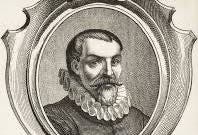Good morning
Serendipity/Sri Lanka - Nova Zemba/Zemblanity and WILLEM BARENTS* born c 1550 (from Icebound : Shipwrecked at the Edge of the World-Andrea Pitzer)
(Nova) Zembla would never lose its hold on the literary imagination. Writer William Boyd would fold the idea of Zembla into his 1998 novel Armadillo, coining a new word from it . Serendipity , he notes, came from Horace Walpole, who invented the word out of a folktale about the island of Serendip ( now Sri Lanka) , in which “heroes were
always making discoveries of things were not in quest of...serendipity , the faculty of making happy and unexpected discoveries by design.”
‘So what is the opposite of Serendip, a southern land of spice and warmth , lush greenery and hummingbirds, sea-washed, sun basted? Think of another world in the far north, barren , icebound, cold , a world of flint and stones. Call it Zembla. Ergo: zemblanity, the opposite of serendipity , the faculty of making unhappy, unlucky, and expected discoveries by design.’
Along with making Zembla legendary, Barents and men would themselves become famous. By 1600 , less than four years after their frozen Twelfth Night feast on Nova Zembla , William Shakespeare would write his own play about the same holiday . Twelfth night likewise tells the story of a world turned upside down on this strangest of holidays, in which the high are brought low and everything spins topsy -turvy. A not-quite-dead twin, cross-dressing, and a plot, nestled around switched identities lead to comedy of errors with its own holiday feast at the centre- and a reference to Barents .
When one character earns another’s disdain, he’s told ,
“You are now sailed into the north of my lady’s opinion; where you will hang like an icicle on a Dutchman’s beard .”
In the space of a handful of years, the tale of Dutchmen covered in ice at the northern edge of the world would cross borders to become an international cultural touchstone.’
*FROM BRITANNICA:
Willem Barents (born c. 1550—died June 20, 1597, the Arctic) was a Dutch navigator who searched for a northeast passage from Europe to Asia and for whom the Barents Sea was named. Because of his extensive voyages, accurate charting, and the valuable meteorological data he collected, he is regarded as one of the most important early Arctic explorers.
Now I’m putting the kettle on- whats your tipple?
NB
Photo on top taken on a windy hill top in and around Fort William, Scotland and not Novaya Zemlya (new land). Wishful thinking ha ha .






Great stuff Cerys. I’ve been messing around in the polar regions too recently. The British explorer John Franklin who like Barents, lost his life searching for a passage across the northern seas (west in his case - east in Barents) was rescued by a whaling ship from Hull. Two of my ancestors were whaling captains from there and I can only imagine the privations that men like them suffered. There’s a fascinating bit on the Wikipedia entry for Barents about the shelter he made with his crew to protect them during one Arctic winter and which was discovered untouched three hundred years later.
Thanks for sharing your Substack story Cerys, I’ve been fortunate enough to have visited the Maldives 3 times and have always been fascinated by Sri Lanka (formerly Ceylon) because I drink so much tea. It’s an Irish Roman Catholic thing, tea is the answer to solving all the problems of the day. Paradoxically I’m sat here having my morning coffee and a fag before I start my day. I’ve only ventured onto Ben Nevis once when raising money climbing the 3 peaks of England, Scotland and Wales. Got 800 meters up at 5 o o’clock in the morning, could t stand the midgies so walked back down with a girl who’d hurt her ankle. Went and bought the Sunday papers and sat in McDonalds having coffee and fags whilst my colleagues the intrepid explorers went to the top and back down again. I have a friend who loves words and is always beating me at scrabble coming up with amazing new words and educating me. Have a great weekend and show. Paul from Coventry Soul 113 x